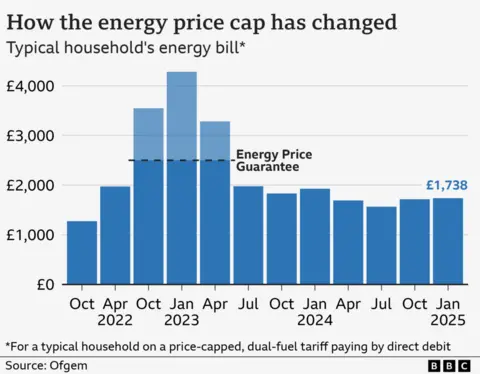ARTICLE AD BOX

 Getty Images
Getty Images
Domestic energy prices have risen with little respite expected for billpayers during the rest of the year.
The second increase in Ofgem's price cap this winter takes effect on Wednesday and means someone paying by direct debit and using a typical amount of gas and electricity will pay £1,738 a year.
That is £21 a year more than under the previous cap, so billpayers are being urged to submit a meter reading to avoid overpaying on estimated usage.
Bills are about 50% higher than pre-Covid levels, and analysts predict they will rise by a further 3% in April.
The regulator, Ofgem, which sets the cap covering 26 million households in England, Wales and Scotland, has urged people to shop around for the best deal.
The best fixed-price deals are cheaper than tariffs based on the price cap.
While these deals offer certainty, anyone signing up to one risks missing out were prices to fall before the fixed element expires.
Owing to rising wholesale prices, analysts at energy consultancy Cornwall Insight predict an additional rise in the price cap in April of nearly 3%. It has forecast prices to then drop in July, only to rise again in October.
Prices jumped in 2022 when conflict between Russia and Ukraine broke out.
Analysts and regulators admit prices and the situation globally are still volatile and difficult to predict.
"As we look ahead, consumers must brace for continued fluctuations," said Craig Lowrey, principal consultant at Cornwall Insight.
Many households will worry about energy prices rising, albeit by only 1%, at the coldest time of the year.
Campaigners are calling for an insulation programme to help those in the toughest financial circumstances to reduce their bills.
"We need long-term solutions," said Caroline Simpson, from Warm This Winter, which speaks for 40 charities.


The cap affects those on default, variable tariffs, and is set every three months by Ofgem.
The regulator illustrates the change by showing the impact on the annual bill of a household with typical energy usage - which works out as £1.75 extra a month compared with the previous cap.
To estimate the effect on an individual's annual costs, billpayers can add 1.2% to their current bill.
The cap is 10% down on the same period last year, but Ofgem has said many billpayers will still be stretched.
Millions of pensioners no longer receive the winter fuel payment to assist with bills, as it is now means-tested.


Shaun Toussaint says you can shop around even without internet access
Energy companies are urging those not on a smart meter to submit an accurate reading immediately.
"If you leave it any later than this, then some of your December energy usage could end up being estimated and therefore charged under the higher January rates," said Elise Melville, from price comparison website Uswitch.
While the cost of each unit of gas and electricity is capped, the total bill is not. So, a long, cold winter could see higher energy use and high bills.
Experts say more significant long-term options to lower bills include shopping around or reducing energy use when possible.
At The Grange Community Centre, in Blackpool, experts are on hand to offer guidance for visitors, including support worker Shaun Toussaint.
"I would always tell people that as long as they're competent online, to go and see what different prices are available," he said.
"If you're not competent online they can get on the phone and ring their existing provider or another provider and compare prices."


Ellen Ryan is a community support worker
A period of high prices means households have collectively built up debt of £3.8bn to suppliers.
The average household in arrears owes more than £1,500 for electricity and £1,300 for gas.
Community support worker Ellen Ryan said that anyone struggling should ask for help.
"My top tip is to come out and find your local community centre, whether that's a library or a centre and to engage there. That will help you to keep your bills low at home," she said.
The latest change in prices means:
- Gas prices are capped at an average of 6.34p per kilowatt hour (kWh), and electricity at 24.86p per kWh - up from 6.24p and 24.5p respectively. A typical household uses 2,700 kWh of electricity a year, and 11,500 kWh of gas
- Households on pre-payment meters are paying slightly less than those on direct debit, with a typical bill of £1,690
- Those who pay their bills every three months by cash or cheque are paying more, with a typical bill of £1,851
- Standing charges - a fixed daily charge covering the costs of connecting to a supply - have fallen very slightly to 60.97p a day for electricity and 31.65p a day for gas, compared with 60.99p and 31.66p respectively, although they vary by region


Experts' tips to keep bills down
- If your hot water is too hot to wash your hands in, then your setting is too high so turn the boiler down
- Manage your draughts by putting a black bag with scrunched up paper up an unused chimney, or try limiting other draughts around the home
- Limit time in the shower to four minutes. The charity WaterAid has compiled a playlist of four-minute songs to keep you to time
- Consider using a steamer, rather than having separate pans of potatoes and vegetables on separate gas hobs
- Use LED lightbulbs in lamps

 5 months ago
24
5 months ago
24








 English (US) ·
English (US) ·